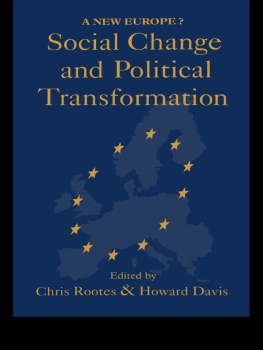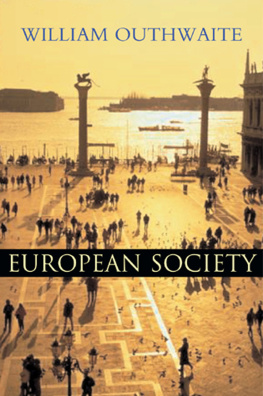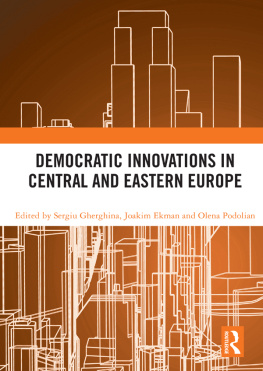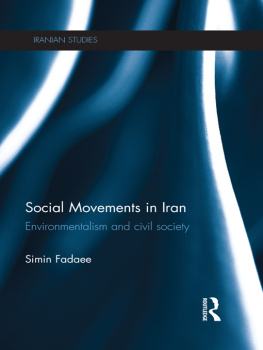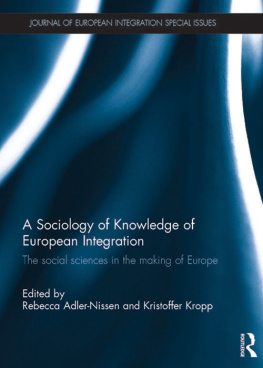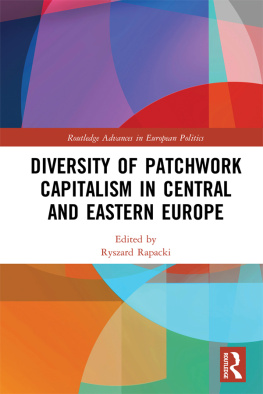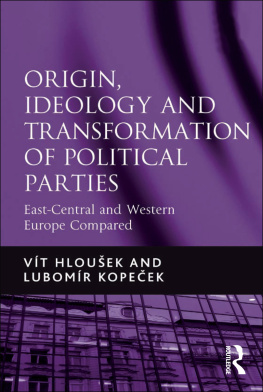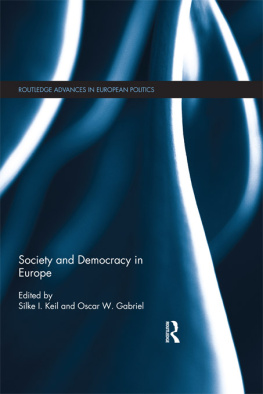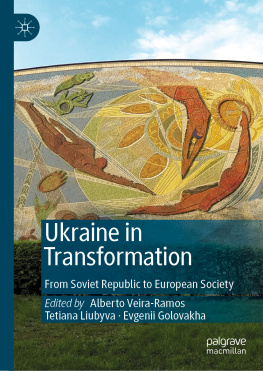Social Change and
Political Transformation
A new Europe?
Economic restructuring and social exclusion
Editors: Phillip Brown and Rosemary Crompton
Social change and political transformation
Editors: Chris Rootes and Howard Daws
Social Change and
Political Transformation
Edited by
Chris Rootes & Howard Davis
University of Kent at Canterbury
Chris Rootes, Howard Davis and contributors 1994
This book is copyright under the Berne Convention.
No reproduction without permission.
All right reserved.
First published in 1994 by UCL Press
UCL Press Limited
University College London
Gower Street
London WC1E 6BT
This edition published in the Taylor & Francis e-Library, 2003.
The name of University College London (UCL) is a registered trade mark used by UCL Press with the consent of the owner.
ISBN 0-203-56551-7 Master e-book ISBN
ISBN 0-203-56613-0 (Adobe eReader Format)
ISBN:
1-85728-147-0 HB
1-85728-148-9 PB
British Library Cataloguing in Publication Data.
A catalogue record for this book is available from the British Library.
Contributors
Sheena Ashford is a Research Fellow at QQSE, University of Sheffield.
Andrew Barry is a Lecturer in the Department of Sociology at Goldsmiths College, University of London.
Andrs Bozki is Associate Professor in Political Sociology in the Faculty of Law and Government, Etvs University of Budapest, and a Fellow of the Central European University in Budapest.
Howard Davis is a Reader in Sociology at the University of Kent at Canterbury.
Dieter Fuchs and Dieter Rucht are researchers at the Wissenschaftszentrum Berlin fr Sozialforschung.
Petr Jehlicka is a research student at Fitzwilliam College and in the Global Security Programme, Faculty of Social and Political Sciences, University of Cambridge. He was previously a member of the Institute of Geography at the Czechoslovak Academy of Sciences in Prague.
Lock Halman is a Research Fellow at IVA, Institute for Social Research, Tilburg University, The Netherlands.
Rainer Lepsius is a Professor in the Institute of Sociology, University of Heidelberg, and co-editor of the Klner Zeitschrift fr Soziologie.
Nick Manning is a Reader in Social Policy at the University of Kent at Canterbury.
Mira Marody is a Professor in the Institute of Sociology at the University of Warsaw.
Chris Rootes is a Lecturer in Sociology and Director of the Centre for the Study of Social and Political Movements at the University of Kent at Canterbury.
Adam Seligman is an Assistant Professor of Sociology at the New School for Social Research, New York. During 19912 he was a Fulbright Fellow at Etvs University of Budapest.
Martin Shaw is Reader in Political and International Sociology at the University of Hull.
Alain Touraine is Director of CADIS, the Centre for Sociological Analysis and Intervention, at the Ecole des Hautes Etudes en Sciences Sociales, Paris.
Acknowledgements
We are indebted to Nicola Kerry, Nicola Cooper and Yvonne Latham for their help with the word-processing, to Katy Pickvance for her assistance with the translation of Chapter 9, and to Nick Dalziel, until recently Publications Officer of the British Sociological Association, for his help in securing the publication of this and its companion volume.
Introduction
Chris Rootes
In 1989, when we first proposed the theme A New Europe? for the 1992 Annual Conference of the British Sociological Association, the Berlin wall had just fallen, talk of our common European home began to seem more than merely wishful thinking, and western Europe was being encouraged eagerly to anticipate 1992, when the completion of the Single European Market would bring real substance to the promise of the European Community (EC). We wanted to bring Europe to the top of the agenda of British sociology because we believed, as we believe still, in the desirability of cross-nationally comparative sociological research, but also because we considered that some of the enthusiasm for European integration was indiscriminate and needed, as a corrective, a stiff dose of critical sociological analysis. We imagined then that we should be writing this amidst a wave of euphoria about the New Europe taking shape before our eyes, and that we should be orchestrating pinpricks of dissent against the excesses of Eurohype and internationalist fervour.
Alas not so. The Europe in which we write is an altogether more sombre place than we could have imagined: the European Community seems at times to be in danger of unravelling under the impact of continuing difficulties surrounding ratification of the Maastricht Treaty, the recurrent crises of the Exchange Rate Mechanism (ERM), and the consequences of the European recession; the post-communist states of eastern Europe, their economies in tatters, appear to teeter from crisis to the edge of catastrophe; a war of a savagery not seen in Europe for more than a generation rages in what used to be Yugoslavia and threatens to overflow into the rest of the Balkans; resurgent nationalism threatens the security of ethnic minorities and the exclusion of refugees and asylum-seekers. What we imagined would be the unfashionable scepticism of our contributors in the face of euphoria about Europes golden future seems more in tune with the tenor of the times than we could have anticipated. Indeed, there is such widespread disenchantment with the vision of a Europe united, peaceful and prosperous from the Atlantic to the Urals that we are in danger of losing sight of what has been achieved.
In view of the recent changes in both western and eastern Europe, it seems opportune to reconsider the question of convergence among European societies. The sociological discussion of convergence has centred around the debate stimulated by Clark Kerr and his colleagues (Kerr et al. 1960) over the extent to which a logic of industrialism was producing such changes in all industrialized societies as amounted to their convergence upon a model of pluralistic industrialism. Assessment of the extent to which such long-term processes of change in technology, organization and values are at the root of recent developments is obscured by the more obvious rle played by the interventions of political elites: the expansion and deepening of the EC was and is a deliberate political project of enlightened political elites determined to put Europes war-torn past behind it and to consolidate liberal democracy and prosperity; in the East, the transition from state-socialism is variously represented as the triumph of reforming elites dismayed by the inefficiencies and corruption of state-socialist systems, or as the product of the loss of belief by communist elites in their own competence and fitness to rule. Secular tendencies associated with the logic of industrialism have undoubtedly played a part in the background to and the outcomes of these processes, but any account that did not give primacy to the rle of political will (or the loss of it) would be seriously inadequate.

